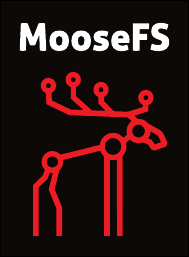MooseFS – Open Source, Petabyte, Fault-Tolerant, Highly Performing, Scalable Network Distributed File System (Software-Defined Storage)

MooseFS is a Petabyte Open Source Network Distributed File System. It is easy to deploy and maintain, highly reliable, fault tolerant, highly performing, easily scalable and POSIX compliant.
MooseFS spreads data over a number of commodity servers, which are visible to the user as one resource. For standard file operations MooseFS acts like ordinary Unix-like file system:
Distinctive MooseFS features:
mfsbdev)MooseFS can be installed on any POSIX compliant operating system including various Linux distributions, FreeBSD and macOS:
MooseFS Client uses FUSE library, available for: Linux & BSD and macOS.
There is a separate MooseFS Client for Microsoft Windows available, built on top of Dokany.
You can install MooseFS using your favourite package manager on one of the following platforms using officially supported repositories:
Packages for CentOS 6 are also available, but no longer supported.
Debian packages are compatible with Proxmox.
CentOS packages are compatible with Rocky Linux, AlmaLinux and openSUSE Leap.
Minimal set of packages, which are needed to run MooseFS:
moosefs-master MooseFS Master Server for metadata servers,moosefs-chunkserver MooseFS Chunkserver for data storage servers,moosefs-client MooseFS Client – client side package to mount the filesystem.Feel free to download the source code from our GitHub code repository!
Install the following dependencies before building MooseFS from sources:
sudo apt install build-essential libpcap-dev zlib1g-dev libfuse3-dev pkg-configsudo apt install build-essential libpcap-dev zlib1g-dev libfuse-dev pkg-config)sudo yum install gcc make libpcap-devel zlib-devel fuse3-devel pkgconfigsudo yum install gcc make libpcap-devel zlib-devel fuse-devel pkgconfig)Recommended packages:
sudo apt install fuse3sudo apt install fuse)sudo yum install fuse3sudo yum install fuse)make install). To install them, run make install (as root or sudo make install) manually.Just three steps to have MooseFS up and running:
moosefs-master packageroot):
cd /etc/mfscp mfsmaster.cfg.sample mfsmaster.cfgcp mfsexports.cfg.sample mfsexports.cfg
root):
cd /var/lib/mfscp metadata.mfs.empty metadata.mfschown mfs:mfs metadata.mfsrm metadata.mfs.empty
root): mfsmaster startmfsmaster name, e.g. by adding a DNS entry (recommended) or by adding it in /etc/hosts on all servers that run any of MooseFS components.moosefs-chunkserver packageroot):
cd /etc/mfscp mfschunkserver.cfg.sample mfschunkserver.cfgcp mfshdd.cfg.sample mfshdd.cfg
At the end of mfshdd.cfg file make one or more entries containing paths to HDDs / partitions designated for storing chunks, e.g.:
/mnt/chunks1/mnt/chunks2/mnt/chunks3
It is recommended to use XFS as an underlying filesystem for disks designated to store chunks. More than two Chunkservers are strongly recommended.
Change the ownership and permissions to mfs:mfs to above mentioned locations:
chown mfs:mfs /mnt/chunks1 /mnt/chunks2 /mnt/chunks3chmod 770 /mnt/chunks1 /mnt/chunks2 /mnt/chunks3
mfschunkserver startRepeat steps above for second (third, …) Chunkserver.
moosefs-client packageMount MooseFS (as root):
mkdir /mnt/mfsmount -t moosefs mfsmaster: /mnt/mfs
or: mfsmount -H mfsmaster /mnt/mfs if the above method is not supported by your system
You can also add an /etc/fstab entry to mount MooseFS during the system boot:
mfsmaster: /mnt/mfs moosefs defaults,mfsdelayedinit 0 0
There are more configuration parameters available but most of them may stay with defaults. We do our best to keep MooseFS easy to deploy and maintain.
MooseFS, for testing purposes, can even be installed on a single machine!
Setting up moosefs-cli or moosefs-cgi with moosefs-cgiserv is also recommended – it gives you a possibility to monitor the cluster online:
moosefs-cli moosefs-cgi moosefs-cgiserv packages (they are typically set up on the Master Server)root): mfscgiserv startIt is also strongly recommended to set up at least one Metalogger on a different machine than Master Server (e.g. on one of Chunkservers). Metalogger constantly synchronizes and backups the metadata:
moosefs-metalogger packageroot):
cd /etc/mfscp mfsmetalogger.cfg.sample mfsmetalogger.cfg
root): mfsmetalogger startRefer to installation guides for more details.
Copyright (c) 2008-2024 Jakub Kruszona-Zawadzki, Saglabs SA
This file is part of MooseFS.
MooseFS is free software; you can redistribute it and/or modify it under the terms of the GNU General Public License as published by the Free Software Foundation, version 2 (only).
MooseFS is distributed in the hope that it will be useful, but WITHOUT ANY WARRANTY; without even the implied warranty of MERCHANTABILITY or FITNESS FOR A PARTICULAR PURPOSE. See the GNU General Public License for more details.
You should have received a copy of the GNU General Public License along with MooseFS; if not, write to the Free Software Foundation, Inc., 51 Franklin St, Fifth Floor, Boston, MA 02111-1301, USA or visit http://www.gnu.org/licenses/gpl-2.0.html.